glossary:
- Studio sound recording – The typical recording studio consists of a room called the studio or live room equipped with microphones and mic stands, where instrumentalists and vocalists perform; and the control room, where sound engineers, sometimes with record producers
- location sound recording – sound mixer is the member of a film crew or television crew responsible for recording all sound recording on set during the filmmaking
- stationary and moving sound – The sound of a stationary object has a constant quality, the pitch and volume stay the same because the microphone is picking up the sound from the same spot. A moving sound source comes from a source that is moving in any direction from the point where sound is being recorded.
- Ambient sound – This is background noise present at a given scene or a location. This can include noises such as rain, traffic, crickets, birds.
- sound effects – a sound other than speech or music made artificially for use in a film.
- music – music is music
- drama dialogue – this advances the plot of a narrative, and revealing the characters feelings or thoughts that cannot be understood.
- contrapuntal sound – sound that contrasts strongly with the image that you see on screen.
Microphone research:


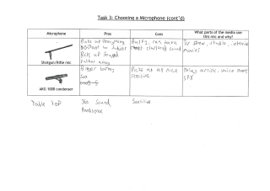
What is a Foley?
Foley is the reproduction of everyday sound effects that are added to films, people called foley artists spend their working day in a studio with 3 people, a mixer this is someone in a booth who hears, edits and decides if it’s a good sound and two foley artists. Named after sound-effects artist Jack Foley, foley can be anything from the swishing of clothing and footsteps to squeaky doors and breaking glass.
What is copyright?
Copyright refers to the legal right of the owner of intellectual property. In simplerterms, copyright is the right to copy. This means that the original creators of products and anyone they give authorization to are the only ones with the exclusive right to reproduce the work.
Copyright law gives creators and right holders economic and moral rights. Economic rights give artists the exclusive right to make copies of their work, distribute it, rent it, lend it, perform, broadcast and generally make the work available to the public in any way they want.
What is the copyright laws?
The Copyright, Designs and Patents Act 1988, is the current UK copyright law. It gives the creators of literary, dramatic, musical and artistic works the right to control the ways in which their material may be used. … Normally the individual or collective who authored the work will exclusively own the rights.
https://copyrightservice.co.uk/copyright/uk_law_summary
https://copyrightservice.co.uk/copyright/p01_uk_copyright_law
https://www.newmediarights.org/business_models/artist/ii_what_can_and_can’t_be_copyrighted
My Foley problem:
Film Four have scenes from a film that has no sound or dialogue. They need this section dubbed for a documentary they are making about horror films. This involves you working to write and record suitable dubbing, Foley sound, library sounds, SFX and copyright free music.
The film and section- The Host 2:06 – 4:47
How will I solve my Foley problem?
With a lot of planning and pre production paper work where I decided to weather we record the sound and make it on our own or take it from a library or somewhere on the internet. we will record with a Zoom H4n Pro audio recorder, upload them to a mac and start editing. With the sounds i am recording i will find something that will make a similar noice, they will only be short sounds.
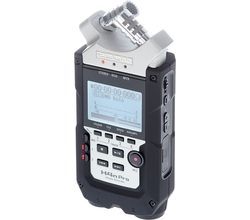


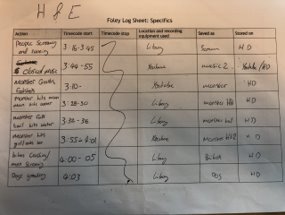
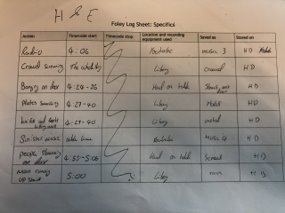
This sheet is showing all the sounds that are there throughout the time we are meant to be doing Foley for, on the right of each sound is telling if we will record it our selfes or get it from a library.
My first Foley project:
My final Foley cover:
Radio Problem
The BBC Radio 4 Audience
• Reach: 11.55 million adults listen to Radio 4 each week, 21.2% of the population.
• Hours: Radio 4 continues to have a very loyal audience. The average Radio 4 listener tunes in for 11
hours 00min each week. In total that makes over 127 million hours every week.
• Share: Share takes all the minutes listened to any radio, and works out what proportion of this Radio 4
makes up. Radio 4’s share of listening is 12.3%, or one in every 8 minutes of all radio consumed.
• Genre: News attracts the largest number of listeners at 10.34m per week, while factual reaches 9.41m.
Drama attracts 6.96 million average listeners a week, and comedy reaches 5.52 million.
• Online: Radio 4 attracts 1.8 million unique browsers to its site each week, the biggest of any BBC Radio
station. Of this 1.8m, 68% of these are on mobile or tablet. There are 5.4m million iPlayer requests for
Radio 4 programmes weekly, providing Radio 4 with a huge digital footprint.
• The station continues to have a balanced audience in terms of gender (49% male / 51% female). The
average age of the Radio 4 listener is 56 years old and skews towards an older audience. Our target
audience of 35-54 ABC1 (commonly termed ‘replenishers’) makes up 24% of the audience. The station
also continues to have an upmarket bias – 75% of those tuning in fall into the ABC1 demographic.

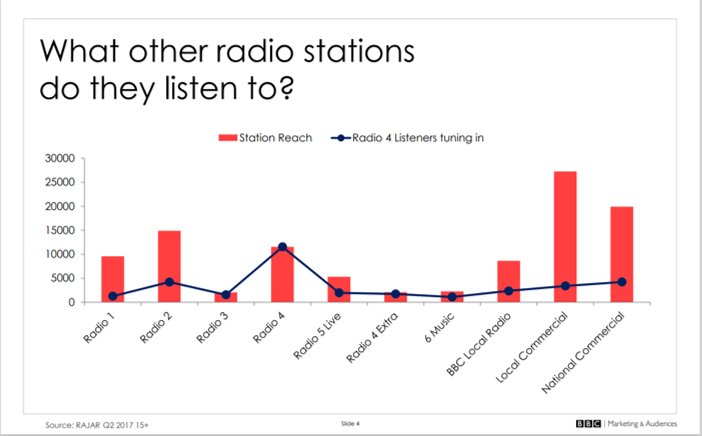
Radio problem is
Radio Four are worried that young people are not listening to radio drama anymore. They are looking for a brand new drama to attract a teen audience. Develop an idea for a one-off 30 minute long drama, write a synopsis for the show and write the script for the opening 5-10 minutes.
radio dramas:
https://www.bbc.co.uk/programmes/m000q3gp
https://www.bbc.co.uk/programmes/m000pxq4
https://www.bbc.co.uk/programmes/m000pqdc
My idea…
I would like to make is as appealing as I possible can for the teens, because this is who I am trying to attract. As a 16 year old I would be more inclined to watch something I can relate too or something I can have fun imagining such as other youth or cowboys and space. I would like to keep it some what simple so I am more inclined to go with something to do with other young people and with that in mind my head goes to kids being lost or taken.
I like the idea of a protagonist but I thing I am going to go with a group of young people, now I have my cast i need a plot line and I needs to not be clichè because a younger audience will lose interest so the most interesting thing to make a story about for me is war or special opps such as the navy seals, i like the idea of a small group of highly skilled navy seal are being shipped off to kill al qaeda but there is a catch, there is only a few of them and its a do or die mission with no second chance or e vac.
synopsis:
In the wake of the September 11 attacks, Captain Mitch Lawson leads a US Special Forces team into Afghanistan for an extremely dangerous mission. Once there, the soldiers develop an uneasy partnership with the Northern Alliance to take down the Taliban and its al-Qaida allies. Outgunned and outnumbered, Nelson and his forces face overwhelming odds in a fight against a ruthless enemy that takes no prisoners.
They team up with a war lord from the north who wants to kill Al-Qaida, by moving in the montins they are able to fine the bases of the enemy and call in air support from a ac 130 and eventually fighting towards a main base they fight against the odds.
The American/Afghanistan war:
Why? Osama Bin Laden, the head of Islamist terror group al-Qaeda, was quickly identified as the man responsible. The Taliban, radical Islamists who ran Afghanistan and protected Bin Laden, refused to hand him over. So, a month after 9/11, the US launched air strikes against Afghanistan.
https://www.bbc.co.uk/news/world-asia-49192495
When? American soldiers starting to be sent off to Afghanistan in 2001 and to this day there are 4,500 american soldiers over there fighting still to this day.
Character profiles:
Team Leader: captain Mitch Lawson character 1
male, big build, classic army protagonist. Family of three, one daughter and a wife. smart, strong minded leader, good combat skills, speaks many languages. Wants to prove himself as a leader. fearless but smart. lenient with people but can also know when and what to say or do.
Emily: wife character 2
blond female, 5`7 smart, not working as she is looking after their child when Mitch is working.
Lily: child character 3
7 years old, female, small girl, blond
script- First 5 Mins…
Scene#1
(opening)
multiple news programs:
(Tv in background)
“11 February 1993. A massive explosion ripping through the lower basement sections of the World Trade Center under tower number two. A terrorist bomb, how horrific a crime this is. August 1998. Our embassies in Nairobi and Dar es Salaam were bombed. The Bin Laden terrorist network was responsible. Suicide bombers blew a hole in the ship. My prayers are with the families of those killed at the explosion involving the U.S. naval vessel Cole. Hidden in the mountains of Afghanistan, Bin Laden planned these attacks. September 9th, 2001. Ahmad Shah the leader of the Northern Alliance, was assassinated by two members of Al-Qaeda. Ahmads death destabilized the Northern Alliance, removing the only threat to the Taliban’s power in Afghanistan.
character 1 (slowly turining his head in concern)
character 3 (daughter) ‘Daddy whats wrong?’
character 1 ‘Nothing sweety!’
mitch looks at his wife with a look of sadness and his with the same look back
character 2 (wife) ‘You have to go right?’
character 1 ‘I dont have to go…’ (looking at his young daughter)
character 3 ‘Daddy are you still taking me to school?’
character 1 (with a sad and guilty look on his face) ‘Yes baby of course, and picking you up!’
End
My survey:
https://www.surveymonkey.co.uk/r/5DJSSVF
results: https://www.surveymonkey.com/results/SM-YRKVBGMK9/
Evaluation-
Has your Radio 4 script addressed the needs of the target audience? How? Yes! I feel that it addressed them perfectly as the story is interesting and younger people can actual get into it, its also good for older ages who have experienced a war or conflict in there life and will also find it interesting.
How did your Foley solution meet your original intentions? Does it sound the way you wanted it to? Our Foley was successful although I did not record as many of my own sounds as i may have wanted to but it was difficult to get a sound i wanted but the ones i did i feel the sounded just as i wanted them too, using the audio record it was very simple to record and it was a new piece of equipment i hadn’t used yet, it was fun.
What types of sound did you create? Provide some examples of how you generated Foley sounds. Were they all successful? How did you solve the problem? I made some of the more unique noises such as a plastic tray, knifes and forks hitting the wall, plates smashing and slamming on doors. For the plastic tray i used a big platform of lego and i used it the put it down and pick it up in the table it the resemblance was perfect, the knifes and forts were also quite different to what you might image but I had a mental tea pot and put a knife and fort inside and shook the pot.
What are the strengths and weaknesses of your work? I feel a strengths of mine was defiant the editing as I didn’t have many of my own sounds but the editing really makes it sound good and carries me in this project. A weakness of mine was being decisive because i only have a set amount of time and trying to chooses and make a sound i thought was good it was kinda too late so i didn’t have too many of my own sounds but i guess that can be seen as a positive and negative.
